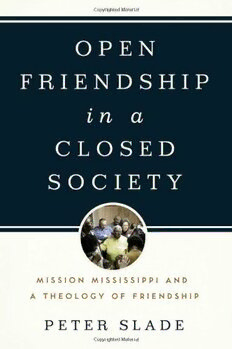
Open Friendship in a Closed Society: Mission Mississippi and a Theology of Friendship PDF
275 Pages·2009·1.916 MB·English
Most books are stored in the elastic cloud where traffic is expensive. For this reason, we have a limit on daily download.
Preview Open Friendship in a Closed Society: Mission Mississippi and a Theology of Friendship
Description:
Mission Mississippi is the largest interracial ecumenical church-based racial reconciliation group in the United States. Peter Slade offers a sustained examination of whether the Mission's model of racial reconciliation (which stresses one-on-one, individual friendships among religious people of different races) can effectively address the issue of social justice. Slade argues that Mission Mississippi's goal of "changing Mississippi one relationship at a time" is both a pragmatic strategy and a theological statement of hope for social and economic change in Mississippi. Carefully tracing the organization's strategies of biracial church partnerships and sponsorships of large civic events, and intercessory prayer breakfast groups, he concludes that they do indeed offer hope for not only for racial reconciliation but for enabling the mobilization of white economic and social power to benefit broad-based community development. At the same time, he honestly conveys the considerable obstacles to the success of these strategies. Slade's work comes out of the vibrant Lived Theology movement, which looks at the ways theologies go beyond philosophical writings to an embodiment in the grassroots lives of religious people. Drawing on extensive interviews and observations of Mission Mississippi activities, church sources, and theological texts, this book is important not only for scholars of theology and race relations but also Southern studies and religious studies.
See more
The list of books you might like
Most books are stored in the elastic cloud where traffic is expensive. For this reason, we have a limit on daily download.
